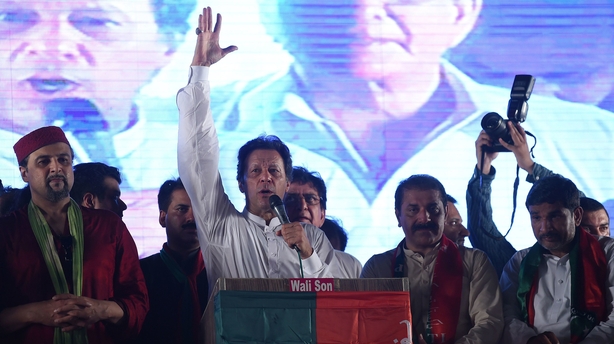At least 31 people were killed and dozens injured in a suicide bomb attack on a polling station in southwest Pakistan as millions voted in a nationwide election.
Charred vehicles littered the road near the polling station in the Balochistan provincial capital Quetta, as the dead and injured were shuttled to hospital accompanied by distraught loved ones.
Local officials said the bomber was trying to enter the polling station when police intervened and the attacker detonated his explosives.
The dead include five policemen and an eight-year-old girl.
The attack was claimed by the so-called Islamic State group through its official Amaq news agency.
It was IS's latest assault on Balochistan, Pakistan's poorest and most volatile province that struggles with multiple Islamist and separatist insurgencies.
Voters appeared undeterred, returning to polling booths after the dead and injured had been evacuated.
Balochistan has suffered the brunt of a series of attacks that killed more than 180 people across Pakistan during the brief but acrimonious election campaign. A blast in Mastung district also claimed by IS killed 153 people including local politician Siraj Raisani.
He was one of three election candidates killed by militants during the election campaign.
An earlier attack in Balochistan tosday left one policeman dead and three wounded when a hand grenade was thrown at a polling station in the village of Koshk, in Khuzdar district.
Polls opened today in a tense, unpredictable election that could be former cricketer Imran Khan's best shot at power.
The election follows a campaign marred by allegations of military interference and a series of deadly attacks.
More than nine million new female voters have registered for the vote in the deeply patriarchal country.
The vote is meant to be a rare democratic transition of power in the nuclear-armed country, which has been ruled by the powerful military for roughly half its history.
However, it has been dubbed Pakistan's "dirtiest election" due to widespread accusations of pre-poll rigging by the armed forces, with Mr Khan believed to be the beneficiary.
Up to 800,000 police and military forces have been stationed at more than 85,000 polling stations across the country.
In Bani Gala, a suburb of the capital Islamabad, media massed outside the polling station where Mr Khan is due to cast his vote.
In Lahore, heavy contingents of police and military could be seen ahead of polls opening.
The election has largely boiled down to a contest between former prime minister Nawaz Sharif's incumbent Pakistan Muslim League-Nawaz (PML-N) and Mr Khan's Pakistan Tehreek-e-Insaf (PTI).

Mr Khan is campaigning on populist promises to build a "New Pakistan", vowing to eradicate corruption, clean up the environment and construct an "Islamic welfare" state.
His campaign has been dogged by widespread accusations he is benefitting from the support of the country's powerful security establishment, with the media, activists and think tanks decrying a "silent coup" by the generals.
The military has rejected the accusations, saying it has no "direct role" in the electoral process.
Election authorities have granted military officers broad powers inside polling centres that have further stirred fears of possible manipulation.
Mr Khan has also raised eyebrows in recent weeks as he has increasingly catered to hardline religious groups, sparking fears a win for PTI could embolden Islamist extremists.
The PML-N, on the other hand, said it was the target of the alleged military machinations, with candidates under pressure and Mr Sharif ousted from power last year and jailed over a corruption conviction days before the vote, removing Mr Khan's most dangerous foe from the race.
His brother, Shahbaz, is leading the party's campaign.
More than 19 million new voters, including millions of women and youth, may prove decisive in the close race.

